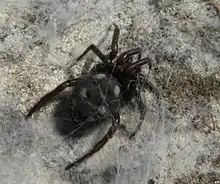Uroctea
Uroctea is a genus of spiders that is found in Eurasia and Africa. It is sometimes put into its own family, Urocteidae. Their tent-like web is very similar to the ones Oecobius builds; but Uroctea species do not have a cribellum.
| Uroctea | |
|---|---|
 | |
| Uroctea sp. from Israel | |
| Scientific classification | |
| Kingdom: | Animalia |
| Phylum: | Arthropoda |
| Subphylum: | Chelicerata |
| Class: | Arachnida |
| Order: | Araneae |
| Infraorder: | Araneomorphae |
| Family: | Oecobiidae |
| Genus: | Uroctea Dufour, 1820 |
| Species | |
|
U. durandi | |
| Diversity | |
| 18 species | |
Species
The 18 species of this genus include:[1]
- Uroctea compactilis L. Koch, 1878 (China, Korea, Japan)
- Uroctea concolor Simon, 1882 (Yemen)
- Uroctea durandi (Latreille, 1809) (Mediterranean)
- Uroctea grossa Roewer, 1960 (Iran, Afghanistan)
- Uroctea hashemitorum Bosselaers, 1999 (Jordan)
- Uroctea indica Pocock, 1900 (India)
- Uroctea lesserti Schenkel, 1936 (China, Korea)
- Uroctea limbata (C. L. Koch, 1843) (Palearctic)
- Uroctea manii Patel, 1987 (India)
- Uroctea matthaii Dyal, 1935 (Pakistan)
- Uroctea paivani (Blackwall, 1868) (Canary Is., Cape Verde Is.)
- Uroctea quinquenotata Simon, 1910 (South Africa)
- Uroctea schinzi Simon, 1887 (South Africa)
- Uroctea semilimbata Simon, 1910 (South Africa)
- Uroctea septemnotata Tucker, 1920 (Namibia, South Africa)
- Uroctea septempunctata (O. P.-Cambridge, 1872) (Israel)
- Uroctea sudanensis Benoit, 1966 (Sudan, Somalia, Yemen)
- Uroctea thaleri Rheims, Santos & Harten, 2007 (Turkey, Israel, Iran, Yemen, India)
This article is issued from Wikipedia. The text is licensed under Creative Commons - Attribution - Sharealike. Additional terms may apply for the media files.